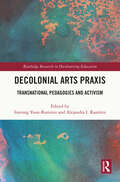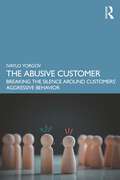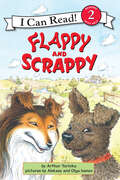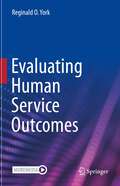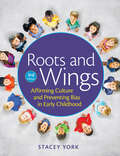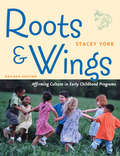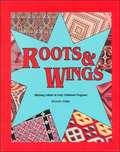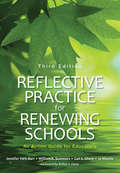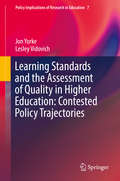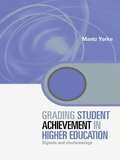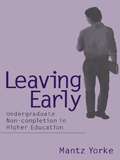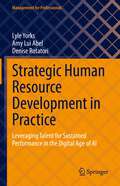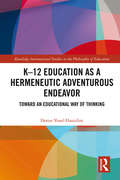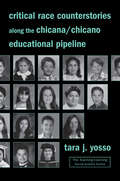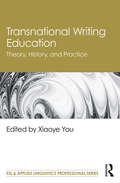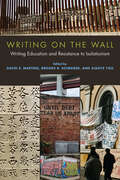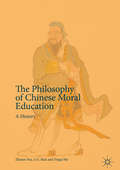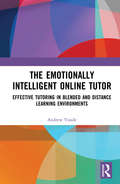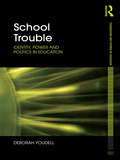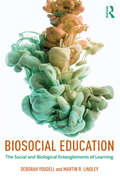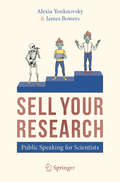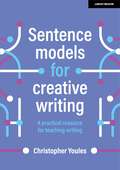- Table View
- List View
Decolonial Arts Praxis: Transnational Pedagogies and Activism (Routledge Research in Decolonizing Education)
by Injeong Yoon-Ramirez Alejandra I. RamírezDecolonial Arts Praxis: Transnational Pedagogies and Activism illustrates the productive potential of critical arts pedagogies in the ongoing work of decolonization by engaging art, activism, and transnational feminisms. Offering contributions from scholars, educators, artists, and activists from varied disciplines, the volume highlights how arts can reveal intersectional forms of oppression, inform critical understandings, and rebuild transnational solidarities across geopolitical borders. The contributors present forms of enquiry, creative writing, art, and reflection which grapple with issues of colonialism, racism, and epistemological violence to illustrate the power of decolonial arts pedagogies in formal and informal education. Using a range of multiple and intersectional critical lenses, through which readers can examine ways in which transnational feminist theorizing and art pedagogy inform, shape, and help strategize activism in various spaces, it will appeal to scholars, postgraduate students, and practitioners with interests in arts education, the sociology of education, postcolonialism, and multicultural education.
The Abusive Customer: Breaking the Silence Around Customers’ Aggressive Behavior
by Ivaylo YorgovBreaking the silence around an all-too-common problem, this book offers insights into the triggers of customer aggression against service employees, explores its consequences, and provides practical advice for handling abusive customers and mitigating the damage they inflict. Today, more than half of the world’s population is employed in the service sector. This fundamental economic shift is accompanied by heightened attention to customer service and the ‘customer is always right’ paradigm. But when customers act aggressively, everyone pays a price: frontline employees, their families, their companies, and even the abusive customers themselves. Unlike breezier titles on the subject, this book is based in academic research—exploring the ‘why?’ and ‘when?’ behind abusive behavior—that underpins its practical approach, illustrated with real-world stories from professionals on the front lines of customer service. The book’s useful tools include a sample anti-customer abuse policy and management process, a cheat sheet of practices that work for handling its consequences, a summary of effective service recovery processes and practices, and abuse-handling training list and curriculum templates. Managers and workers in customer-facing roles, in industries such as retail, hospitality, tourism, banking, and contact centers, will welcome this essential resource as part of their efforts to stop aggressive customer behavior, and improve employee morale, job satisfaction, and engagement.
Flappy and Scrappy (I Can Read Level 2)
by Arthur YorinksFlappy and Scrappy are friends - the kind who know just what to say when one feels sad. They′re the kind of friends who will play even when they don′t really want to, just to make the other happy. The kind who never forget a birthday. What kind of friends are they? Best friends.These three easy-to-follow stories about friendship will delight beginning readers everywhere.
Evaluating Human Service Outcomes
by Reginald O. YorkThis all-in-one text assists human service practitioners, and the students of human service educational programs, in the evaluation of their practice with their clients. It takes readers through the entire research process, step by step, starting with the literature review on the nature of the behavior being served, to the development of their study methods, to the statistical analysis of data using the internet and, finally, to the drawing of conclusions based on the outcome study that was conducted. When readers complete this book, they will be prepared to conduct an outcome evaluation study and to present a report to their agencies or instructors. Key distinctions of this text include: guides for analysis of data using Excel, the internet or SPSS for statistical analysis of data; the separation of content into basic concepts and intermediate concepts for use in beginning and intermediate courses in human service research methods; an instructor's manual that offers outlines, lists, and test questions additional to those in the text; a student workbook with practice assignments for use in courses as well as a set of checklists that serve as a guide for various tasks in the research process; and objectives, summaries, and tests in all chapters. Evaluating Human Service Outcomes could be used as the basic text for a beginning course in human service research in educational programs in social work, counseling, and psychology where a major goal is to complete a research study. It could also be used as a supplemental text for advanced research courses that include the analysis of data. The text also should be of interest to human service practitioners who are working in programs funded by grants that require outcome evaluation.
Roots and Wings: Affirming Culture and Preventing Bias in Early Childhood
by Stacey YorkUse the updated activities, examples, and research to improve your anti-bias and multicultural education programs. This clear and practical guide includes expanded information on English language learners, family engagement, culturally responsive teaching, and staff training. Stacey York teaches child development at Rochester Community and Technical College and established E-LECT, a collaborative effort between thirteen Minnesota community and technical colleges to provide e-learning for early childhood teachers.
Roots and Wings, Revised Edition
by Stacey York"Roots and Wings will open doors to beginners in cultural diversity education, and will enrich the more experienced readers. It is a grand tool for assisting early childhood educators to address the many-faceted and complex issues of cultural diversity and racial prejudice. . . . I recommend this book to any teacher, caregiver, or parent who wants to begin learning what it means to foster young children's respect for themselves and others."--Louise Derman-Sparks, author, AntiBias CurriculumMore than a decade ago, Roots and Wings was published as the first practical resource for early childhood teachers on the then new topic of multicultural education. This invaluable guide is now completely updated to respond to present day anti-bias issues in educating young children.Roots and Wings provides a thorough, clear, and practical introduction to working with diverse children and families in early childhood settings. With more than 100 new and revised activities, practical examples, and staff training recommendations, the revised edition includes new chapters on bilingual education, culturally responsive teaching, and children and prejudice. Seamlessly blending theory and practice, Roots and Wings is an ideal resource for preschool teachers, early childhood programs at colleges and universities, and training workshops.Stacey York is an instructor in the Child Development Department at Minneapolis Community and Technical College, Minneapolis, Minnesota. She conducts multicultural workshops around the country and is also the author of Big As Life: The Everyday Inclusive Curriculum.
Roots and Wings
by Stacey L. YorkA new edition of the best-selling guide to multicultural education for young children.
Reflective Practice for Renewing Schools: An Action Guide for Educators
by Dr Jennifer York-Barr William A. Sommers Dr Gail S. Ghere Joanne K. MontieRenew your teaching and your passion with this updated bestseller! When the teaching life gets tough, reflective practice reenergizes you—counteracting the effects of professional isolation and instilling a sense of meaning, renewal, and empowerment that benefits you, your colleagues, and your students. This bestselling book offers research-based ideas and strategies for using reflective practice individually, with others, and even schoolwide. Features of the newest edition include: Updated strategies for engaging adults and students and using reflective practices to create equitable outcomes New examples of reflective practice in action A new chapter on the core leadership practices for growing reflective practice A new companion website with resources and reflection protocols
Learning Standards and the Assessment of Quality in Higher Education: Contested Policy Trajectories
by Jon Yorke Lesley VidovichThis book analyses accountability and quality policies relating to learning standards and examines their implications for assessment in higher education. Whilst primarily focusing on the Australian setting, this analysis is located within a broader frame of reference that includes the United Kingdom (UK), the United States of America (US), and the Organisation for Economic Cooperation and Development (OECD). Across these settings, comparative measures of learning have been seen as a policy 'solution' to the problem of 'proving quality' in a globalised and increasingly competitive higher education market. Comparative measures of learning depend on the specification of learning standards. Learning standards attempt to articulate the capabilities expected of graduates, and students' achievement of these is determined through the practices of assessment carried out within institutions. Quality policy, learning standards and assessment practices all intersect within the broader umbrella of accountability, with relevance to governments, higher education providers, employers, parents, and students. The findings reported in this book highlight a number of policy influences, including the rising demands for national and international comparative data on learning standards to compare quality and inform student choice in a globally competitive market.
Grading Student Achievement in Higher Education: Signals and Shortcomings (Key Issues in Higher Education)
by Mantz YorkeA lot hangs on the summative grades that students are given. A good degree opens doors which otherwise might remain closed. Yet, as higher education is now a mass rather than an elite system, what is expected of its graduates is different from the expectations of previous generations. Students are expected not only to be able to demonstrate high standards of academic achievement, but also a variety of capabilities that have at different times been given labels such as ‘generic skills’ and ‘transferable skills’. These abilities are difficult to grade for a variety of reasons and some graduates may be losing out because their particular strengths are given insufficient acknowledgement in current summative assessment practices.Using the UK honours degree classifications as a case study, this book appraises the way in which summative assessment in higher education is approached and shows that the foundations of current practices (in the UK and elsewhere) are of questionable robustness. It argues that there is a need to widen the assessment frame if the breadth of valued student achievements is to be recognised adequately.
Leaving Early: Undergraduate Non-completion in Higher Education
by Mantz YorkePresents the findings of new research into the problem of students dropping-out from their courses, and provides information that will help institutions understand and address the problem. The book clarifies definitions of non-completion, looks at what influences students to leave early, assesses the implications for the institution's performance and the costs to the public purse. The analysis is illustrated by examples of student experience, and highlights courses of action that may help to reduce the problem.
Strategic Human Resource Development in Practice: Leveraging Talent for Sustained Performance in the Digital Age of AI (Management for Professionals)
by Lyle Yorks Amy Lui Abel Denise RotatoriThis book examines human resource development (HRD) strategy as a learning process, connecting learning and adult development with organizational development and change, and talent development, with a particular focus on the use of artificial intelligence (AI). It provides professionals and practitioners as well as students with processes and tools that will help them meet the needs of employees and the organization. It takes a scholar-practitioner perspective connecting theory with practice. HRD has evolved into a mature field of scholarship in recent decades. At the same time, practices of learning and development in organizations continues to evolve dramatically. At the individual, developmental, and organizational levels, workers, managers, and executives have to be continually learning from current and emerging trends in order to strategically reposition themselves for performance and future possibilities. This includes developing the competencies to navigate the complexities of a world in which people are interacting with ‘smart’ digital technologies that are broadly grouped together under the umbrella term artificial intelligence (AI). Featuring specific strategic learning methods and case studies from senior HRD professionals, this book is a valuable resource for managers, practitioners, students, scholars and others interested in strategic HRD practice.
K–12 Education as a Hermeneutic Adventurous Endeavor: Toward an Educational Way of Thinking (Routledge International Studies in the Philosophy of Education #17)
by Doron Yosef-HassidimConsidering the role of compulsory mass education and schooling in a democratic society, this book introduces an alternative vision for K-12 education as an "adventurous endeavour." Grounded in a strong theoretical framework, Yosef-Hassidim reveals the negative impact of instrumentalization of schools: when education is considered a social and political instrument, it serves dominant social forces’ interests rather than students’ or humanity as a whole. Offering conceptual and pragmatic frameworks to limit political influence on schooling, the author proposes a new hermeneutical structure that restores education’s agency and separates it from external social forces, and provides the foundation for regarding K-12 education as a sovereign social sphere in its own right.
Critical Race Counterstories along the Chicana/Chicano Educational Pipeline (Teaching/Learning Social Justice)
by Tara J. YossoChicanas/os are part of the youngest, largest, and fastest growing racial/ethnic 'minority' population in the United States, yet at every schooling level, they suffer the lowest educational outcomes of any racial/ethnic group. Using a 'counterstorytelling' methodology, Tara Yosso debunks racialized myths that blame the victims for these unequal educational outcomes and redirects our focus toward historical patterns of institutional neglect. She artfully interweaves empirical data and theoretical arguments with engaging narratives that expose and analyse racism as it functions to limit access and opportunity for Chicana/o students. By humanising the need to transform our educational system, Yosso offers an accessible tool for teaching and learning about the problems and possibilities present along the Chicano/a educational pipeline.
Critical Race Counterstories along the Chicana/Chicano Educational Pipeline (Teaching/Learning Social Justice)
by Tara J. YossoChicanas/os are part of the youngest, largest, and fastest growing racial/ethnic 'minority' population in the United States, yet at every schooling level, they suffer the lowest educational outcomes of any racial/ethnic group. Using a 'counterstorytelling' methodology, Tara Yosso debunks racialized myths that blame the victims for these unequal educational outcomes and redirects our focus toward historical patterns of institutional neglect. She artfully interweaves empirical data and theoretical arguments with engaging narratives that expose and analyse racism as it functions to limit access and opportunity for Chicana/o students. By humanising the need to transform our educational system, Yosso offers an accessible tool for teaching and learning about the problems and possibilities present along the Chicano/a educational pipeline.
Critical Race Counterstories Along the Chicana/Chicano Educational Pipeline
by Tara J. YossoThe book demonstrates the wealth of minority culture and interest in education. The author elaborates how, counter-stories can build and nurture community, challenge perceived wisdoms, reveal silent voices and transform education.
Transnational Writing Education: Theory, History, and Practice (ESL & Applied Linguistics Professional Series)
by Xiaoye YouArguing that writing teachers need to enable students to recognize, negotiate with, deconstruct, and transcend national, racial, ethnic, and linguistic boundaries, this volume proposes a "transnational" framework as an alternative approach to literacy education and as a vital component to cultivating students as global citizens. In a field of evolving literacy practices, this volume builds off the three pillars of transnational writing education—translingualism, transculturalism, and cosmopolitanism—and offers both conceptual and practice-based support for scholars, students, and educators in order to address current issues of inclusion, multilingual learning, and diversity.
Writing on the Wall: Writing Education and Resistance to Isolationism
by Xiaoye You David S. Martins Brooke R. SchreiberThe first concerted effort of writing studies scholars to interrogate isolationism in the United States, Writing on the Wall reveals how writing teachers—often working directly with students who are immigrants, undocumented, first-generation, international, and students of color—embody ideas that counter isolationism. The collection extends existing scholarship and research about the ways racist and colonial rhetorics impact writing education; the impact of translingual, transnational, and cosmopolitan ideologies on student learning and student writing; and the role international educational partnerships play in pushing back against isolationist ideologies. Established and early-career scholars who work in a broad range of institutional contexts highlight the historical connections among monolingualism, racism, and white nationalism and introduce community- and classroom-based practices that writing teachers use to resist isolationist beliefs and tendencies. “Writing on the wall” serves as a metaphor for the creative, direct action writing education can provide and invokes border spaces as sites of identity expression, belonging, and resistance. The book connects transnational writing education with the fight for racial justice in the US and around the world and will be of significance to secondary and postsecondary writing teachers and graduate students in English, linguistics, composition, and literacy studies. Contributors: Olga Aksakalova, Sara P. Alvarez, Brody Bluemel, Tuli Chatterji, Keith Gilyard, Joleen Hanson, Florianne Jimenez Perzan, Rebecca Lorimer Leonard, Layli Maria Miron, Tony D. Scott, Kate Vieira, Amy J. Wan
The Philosophy of Chinese Moral Education: A History
by Zhuran You A. G. Rud Yingzi HuThe book depicts a unique historical and cultural phenomenon, the philosophy of Chinese moral education, in an attempt to capture the essence of Chinese culture. While tracing the historical journey of this philosophy, the book rearranges and interprets the conceptual frameworks concerning moral education in various Chinese philosophical schools and religions. In so doing, it summarizes the ideas of human relations, man and nature, cosmology, moral virtues, and educational approaches, posing intriguing questions about how they have influenced Chinese characteristics, social norms, and value orientations. In particular, the book brings up discussions on the culture of family and state, the challenges that the philosophy had encountered in early modern and present China, as well as the prospect of regeneration of the philosophy and its significance for our world today. This is the book to read if you want to have a deep understanding about China and its belief and educational system.
The Emotionally Intelligent Online Tutor: Effective Tutoring in Blended and Distance Learning Environments
by Andrew YoudeThe Emotionally Intelligent Online Tutor foregrounds the tutor within online and blended learning environments, and focusses on desirable skills, qualities and attributes for effective tutoring. It analyses these qualities in relation to prominent psychological constructs, such as emotional intelligence, and the exploration of their value in practice. This book is focussed on the tutoring of adult learners undertaking study within higher education, commonly on a part-time basis whilst studying vocationally relevant degree programmes. However, the contents are applicable and generalisable to those tutoring within informal environments, such as Massive Open Online Courses. Prominent social constructivist models of e-learning are critiqued with alternative actions provided for tutors now practicing in a digital age. The book provides a conceptual model that represents an interpretation of effective practice in a blended learning context. This book will be of great interest for academics, scholars and postgraduate students in the field of education and for e-tutors delivering online and blended courses. Furthermore, it will be useful for those undertaking teacher training, psychology and counselling courses.
School Trouble: Identity, Power and Politics in Education (Foundations and Futures of Education)
by Deborah YoudellWhat is the trouble with schools and why should we want to make ‘school trouble’? Schooling is implicated in the making of educational and social exclusions and inequalities as well as the making of particular sorts of students and teachers. For this reason schools are important sites of counter- or radical- politics. In this book, Deborah Youdell brings together theories of counter-politics and radical traditions in education to make sense of the politics of daily life inside schools and explores a range of resources for thinking about and enacting political practices that make ‘school trouble’. The book offers a solid introduction to the much-debated issues of ‘intersectionality’ and the limits of identity politics and the relationship between schooling and the wider policy and political context. It pieces together a series of tools and tactics that might destabilize educational inequalities by unsettling the knowledges, meanings, practices, subjectivities and feelings that are normalized and privileged in the ‘business as usual’ of school life. Engaging with curriculum materials, teachers’ lesson plans and accounts of their pedagogy, and ethnographic observations of school practices, the book investigates a range of empirical examples of critical action in school, from overt political action pursued by educators to day-to-day pedagogic encounters between teachers and students. The book draws on the work of Michel Foucault, Judith Butler, Ernesto Laclau and Chantel Mouffe, and Gilles Deleuze and Felix Guattari to make sense of these practices and identify the political possibilities for educators who refuse to accept the everyday injustices and wide-reaching social inequalities that face us. School Trouble appears at a moment of political and economic flux and uncertainty, and when the policy moves that have promoted markets and private sector involvement in education around the globe have been subject to intense scrutiny and critique. Against this backdrop, renewed attention is being paid to the questions of how politics might be rejuvenated, how societies might be made fair, and what role education might have in pursing this. This book makes an important intervention into this terrain. By exploring a politics of discourse, an anti-identity politics, a politics of feeling, and a politics of becoming, it shows how the education assemblage can be unsettled and education can be re-imagined. The book will be of interest to advanced undergraduate and postgraduate students and scholars in the fields of education, sociology, cultural studies, and social and political science as well as to critical educators looking for new tools for thinking about their practice.
Biosocial Education: The Social and Biological Entanglements of Learning
by Deborah Youdell Martin R. LindleyIn this groundbreaking text, Youdell and Lindley bring together cutting-edge research from the fields of biology and social science to explore the complex interactions between the diverse processes which impact on education and learning. Transforming the way we think about our students, our classrooms, teaching and learning, Biosocial Education draws on advances in genetics and metabolomics, epigenetics, biochemistry and neuroscience, to illustrate how new understandings of how bodies function can and must inform educational theory, policy and everyday pedagogical practices. Offering detailed insight into new findings in these areas and providing a compelling account of both the implications and limits of this new-found knowledge, the text confronts the mechanisms of interaction between multiple biological and social factors, and explores how educators might mobilize these ‘biosocial’ influences to enhance learning and enable each child to attain educational success. By seeking out transdisciplinary and multi-factor answers to the question of how education works and how children learn, this book lays the foundations for a step-change in the way we approach learning. It is an essential read for researchers, teachers and practitioners involved in educational policy and practice at any level.
SELL YOUR RESEARCH: Public Speaking for Scientists
by Alexia Youknovsky James BowersPublic speaking is an essential component in the life of a scientist, whatever your level of career. In this book, the authors describe a tried-and-tested technique for preparing a presentation: the SELL Method. Following these three simple steps - Skeleton, Envelope, Life & Logistics - will help you make the most out of any talk. Whether it be a 3-minute pitch or an hour-long plenary session, you will find pages of advice, theory and practical exercises enabling you to SELL YOUR RESEARCH with impact.For scientists these days, the work is not done until it is communicated. And now that problem is solved. Solidly researched and immaculately written, Sell Your Research is a goldmine of useful advice. Whether you are brimming with confidence or just setting out, this gem of a guidebook will improve every presentation and nurture every budding science communicator.Dr. Stephen Webster, Director of Science Communication Unit, Imperial College LondonPublic speaking is one of the most intimidating but crucial tasks in a scientist’s career. This book provides a welcoming, clear, step-by-step guide to improving your presentations at every level. Reading it and following its advice will make your science talks less frightening and more enjoyable. Dr. Laura Helmuth, Health, Science & Environment Editor, Washington Post
Sentence models for creative writing: A practical resource for teaching writing
by Christopher YoulesTeaching at sentence level is essential to improve writing. Knowing this, I desperately searched for a book packed full of sentence models that I could use to inspire my students. On discovering that no such book existed, I spent the next year poring over hundreds and hundreds of books to tap into the magic formula of what makes a great sentence. I sorted all these fantastic sentence structures into the domains through which we write stories: action, setting, character, feelings, physical effects, thoughts, the senses, and dialogue. This book contains hundreds of those sentence models. Each chapter also contains practical advice on effectively teaching the different aspects of story writing. The sentences can be used as creative writing exercises, inspiration for your exemplary text, or ideas for writing lessons. This book will reveal the magic formula behind great writing and give you a secret window into how this writing is created.
Sentence models for creative writing: A practical resource for teaching writing
by Christopher YoulesTeaching at sentence level is essential to improve writing. Knowing this, I desperately searched for a book packed full of sentence models that I could use to inspire my students. On discovering that no such book existed, I spent the next year poring over hundreds and hundreds of books to tap into the magic formula of what makes a great sentence. I sorted all these fantastic sentence structures into the domains through which we write stories: action, setting, character, feelings, physical effects, thoughts, the senses, and dialogue. This book contains hundreds of those sentence models. Each chapter also contains practical advice on effectively teaching the different aspects of story writing. The sentences can be used as creative writing exercises, inspiration for your exemplary text, or ideas for writing lessons. This book will reveal the magic formula behind great writing and give you a secret window into how this writing is created.
